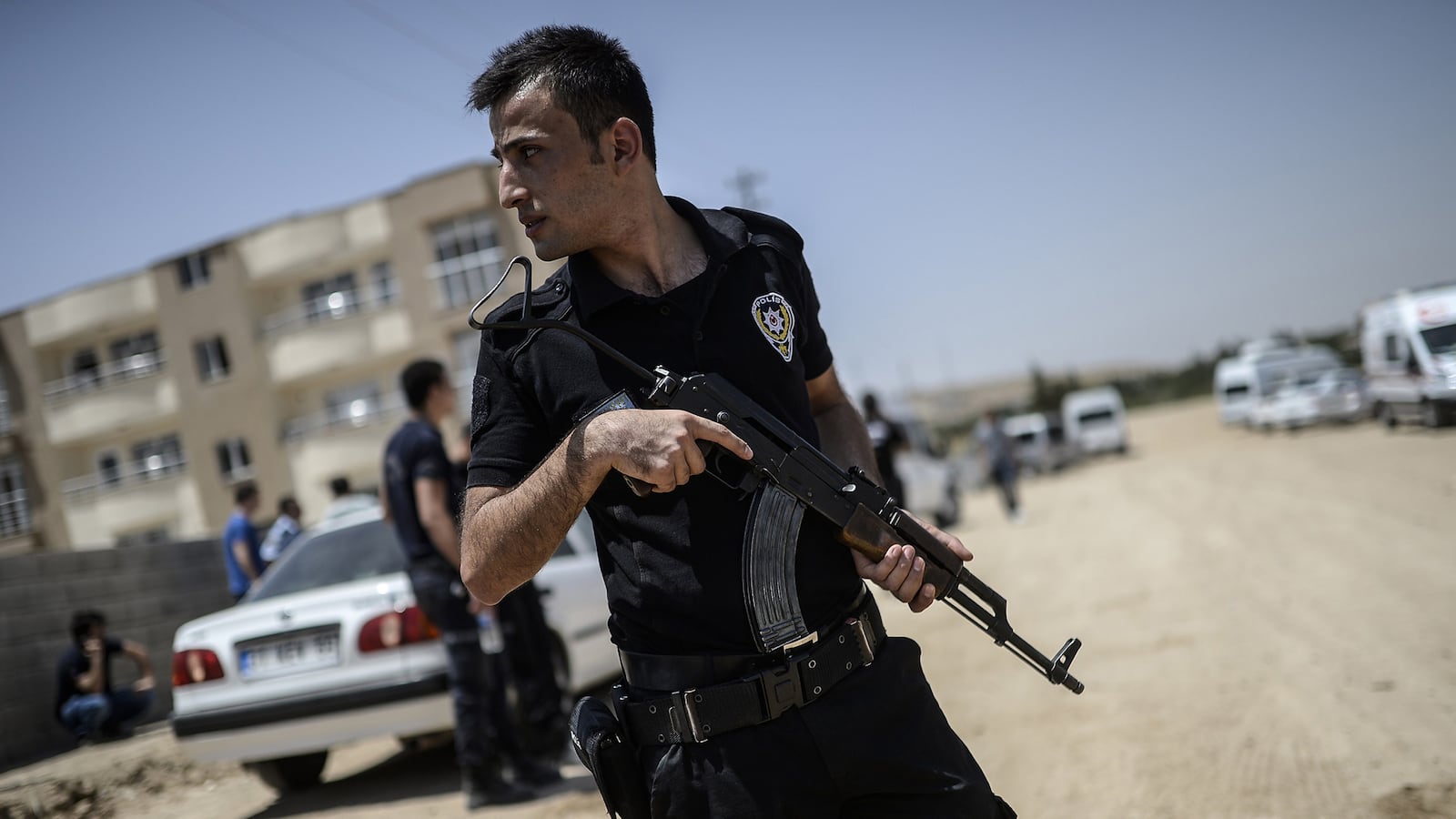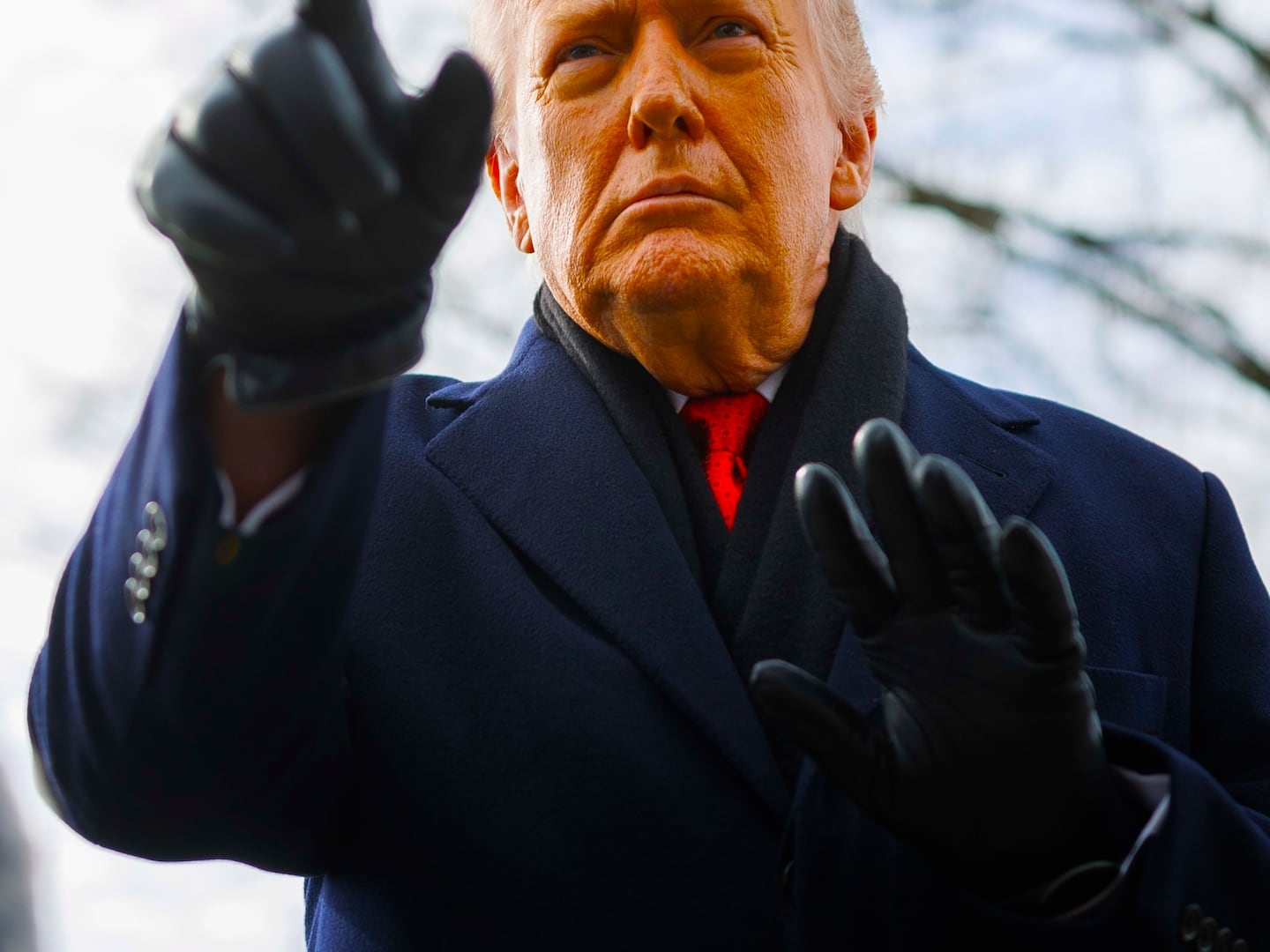Turkey is in serious trouble. The country’s political situation is more unstable today than it has been since 2002. The economy, once hailed for its vigorous growth, is now flagging, violence is back on the streets, and society is incredibly polarized—all thanks to the uncompromising policies of President Recep Tayyip Erdogan and his ruling Justice and Development Party (AKP).
Start with the worst development in years: On Wednesday, the Kurdistan Workers' Party (PKK), whose fighters have been intermittent states of war with the Turkish government for over three decades, murdered two Turkish police officers in revenge, as the PKK put it, for an ISIS-linked suicide bombing in the southeastern city of Suruc, which killed 32 Kurdish activists on Monday. A tenuous ceasefire agreed to between Ankara and the PKK in 2013 is now in tatters. The threat of further acts of terrorism, and heavy-handed military responses, now seems inevitable.
It’s hard to overstate the developments of the last 72 hours. According to Behlul Ozkan, an assistant professor at Marmara University and the author of the book From the Abode of Islam to the Turkish Vatan, the Suruc attack is akin to Turkey’s own September 11. “All of us have been worried an ISIS-coordinated attack would hit us at some point,” Ozkan told The Daily Beast. “Many have been warning about this deadly threat and calling on the AKP government to move swiftly against the ISIS networks inside Turkey for years. So the real issue is that even though such an attack has been on its way, for all intents and purposes, the government has failed to stop it again.”
Allegations that there may be direct ties between ISIS and AKP have been bandied about for years in Turkey’s local and international media. The argument runs that Erdogan, so desperate to overthrow the Assad regime in Damascus and install an Islamist-led government in its place, transformed Turkey into a jihadist gateway into the Syrian opposition-controlled pockets of northern Syria. Lax border security was born of benign neglect, runs this theory, the better to facilitate the flow of radical foreign fighters into a war-torn southern neighbor’s territory, and as a result, ISIS has also established networks and cells on Turkish soil.
While there’s no hard evidence to prove such ISIS-AKP collaboration, the accusations have attained a measure of plausibility that is in itself enormously destructive to the Turkish body politic and any sense of national cohesion. “Many segments of Turkey,” Ozkan said, “from seculars to liberals to Kurds, are suspicious about some unclear tie between the two. On this, the perception of AKP’s support of ISIS is widely shared and agreed by many, whatever the reality.”
To make things worse, AKP leaders, including Erdogan and the man who replaced him as prime minister when he became president, Ahmet Davutoglu, have done little to quash this perception of a marriage of convenience between a democratically elected Islamist party and a genocidal fundamentalist group. The official line propounded by Ankara has been that the PKK’s Syrian affiliate, the Democratic Union of Kurdistan (PYD), which is now supported directly by the anti-ISIS coalition with weapons and close air support, represents the graver threat to Turkish well-being. As recently as a month ago, Sabah newspaper—AKP’s journalistic mouthpiece—published an article stating the matter baldly: “PYD is more dangerous than ISIS.”
This is no mean difference of opinion. Turkey proudly possesses the second-largest army within NATO, following the U.S., a country whose soldiers were maimed and murdered for nearly a decade in Iraq by the forebears of ISIS. Yet ISIS has for two years been able to hoist its black flag along Turkey’s 565-mile border with Syria, all within striking distance of that second-largest army, which has largely refrained from shooting at the jihadists.
ISIS hasn’t exactly repaid the favor, however.
In March 2014, in the Turkish town of Nigde, Benjamin Xu (a German), Çendrim Ramadani (a Swiss) and Muhammed Zakiri (a Macedonian)—all thought to be members of ISIS—clashed with Turkish gendarme forces at a security checkpoint. Gendarme Lt. Adil Kozanoglu and Police Officer Adem Coban were killed in the confrontation. A trial of the foreign perpetrators continues to this day, without any clear sense of how these alleged ISIS militants infiltrated a city of Anatolia in the first place.
On June 11, 2014, Turkey’s consulate in Mosul was raided when ISIS sacked Iraq’s second city and seized the 49 Turkish diplomats and their families therein. The jihadists held them for 100 days before releasing them under still unexplained circumstances (about which more in a moment).
On January 6, 2015, Sultanahmet, the bustling tourist district of Istanbul, witnessed a female Chechen suicide bomber attacking a police station. One police officer was killed and the 18-year-old attacker was later identified as Diana Ramazanova, who had links with extremist jihadi groups in Syria.
On June 5, 2015, only a day before Turkey’s general election, two bombs went off in the southeastern city of Diyarbakir during a campaign rally on behalf of the pro-Kurdish party HDP. The explosions killed four people and injured 402. The attacker was named as Orhan G. Apparently, his parents repeatedly complained to the local authorities that their son may have joined ISIS. Before the attack, Orhan’s mother herself beseeched Prime Minister Davutoglu to help her in locating her son. Yet strangely, his whereabouts were known to the state. On June 4, a day before the twin bombings, Orhan was briefly detained at a hotel in Diyarbakir for failing to report for mandatory military service. Yet he was let go.
Nor has Turkey’s approach toward any research highlighting its own national security problems been in the least bit accommodating or friendly. Many critical Turkish and foreign journalists have been fired, or regularly threatened by the pro-AKP media, often via newspaper headlines or an army of social media trolls to rival the Kremlin's. One of the latest victims was The New York Times’s Turkey reporter Ceylan Yeginsu, who not only earned personal censure from state officials, including Erdogan, but had her photograph exhibited on the front page of a pro-AKP newspaper in an effort to trigger possibly violent backlash against her. All this because Yeginsu dared to published investigative reports detailing ISIS’s extensive recruitment efforts and operational networks in Ankara’s Hacibayram district.
Since the Gezi Park protest movement—Turkey’s Occupy—erupted in the summer of 2013, any and all types of even vaguely anti-government or AKP-critical civic actions, be they public mournings for victims of police brutality or political demonstrations, have been violently suppressed by AKP-controlled authorities. Contrast this with the laissez-faire attitude the government has shown toward thousands of Islamist demonstrators who took to the streets of Istanbul on June 19 in support of creating an ISIS-style caliphate in Turkey. They faced no harassment from the same police force that has proved quick on the trigger, water cannon, or tear gas canister in other (non-Islamist) circumstances, such as the annual LGBT pride march held in Istanbul few weeks ago.
In fact, pro-ISIS crowds were able to pray openly and without any state inference on Eid, the last day of Ramadan, just last week outside Istanbul in a picnic setting. A jihadist leader, Abu Hanzala, took the opportunity to warn the government of dire consequences for its belated series of raids on ISIS-linked networks.
All of which makes the recent escalation in Kurdish-on-Turkish violence even more dangerous. Previously, one of the biggest achievements of Erdogan’s leadership was the inauguration of serious-seeming peace talks between the PKK and the Turkish state. They have been ongoing for the last two years and have both preceded and followed a series of significant reforms aimed at incorporating the Kurds further into Turkey’s society and democratic political establishment. In an unprecedented gesture acknowledging these reforms, imprisoned PKK leader Abdullah Ocalan even announced his intention to quit armed struggle altogether in lieu of politics. As a result, Erdogan became the recipient of a great deal of goodwill—not to mention a sizable share of the Kurdish vote—in the past few years.
All that changed, however, in the 2015 parliamentary election, held just over a month ago. The Kurds turned their back on Erdogan and AKP, and voted overwhelmingly for one of their own, a rising star called Selahattin Demirtas, who first ran (against Erdogan) for the presidency in the summer of 2014. Erdogan and his media surrogates have demonized Demirtas as traitorous and insufficiently Muslim. None of these attacks kept the HDP leader from clearing the 10 percent vote threshold for in June and single-handedly denying AKP a straight-out parliamentary majority. In so doing, he consequently robbed Erdogan of his long-running ambition to revise Turkey’s constitution and create a presidential system of government—with him at the helm, of course. As of now, and because of HDP’s surprise showing at the polls, there is no permanent government in the country, only a caretaker one. Early elections, if the coalition talks collapsed, seem inevitable.
Where once AKP was hailed as the democratic model for the Islamic world, now it more resembles a backsliding authoritarianism, which thinks only of the regime’s continuity rather than the survival of the state. How, it’s widely asked, will Turkey respond to the PKK’s brazen aggression and ISIS jihadism at the same time? By acquiescing to the rise of the latter for too long, it earned the renascent animosity of the former. But the Kurds will not be marginalized or silenced. They have a political clout never before seen, not to mention a military ally in northern Syria with an impressive international reputation, certified by American hard power, as the bravest and most competent foe to ISIS. The future looms dark for Turkey. A terrible unintended consequence of a grinding civil war in Syria may yet prove to be another one in Turkey. And if that happens, the fault will lie principally at the feet of President Erdogan and his party’s Islamist elites.






